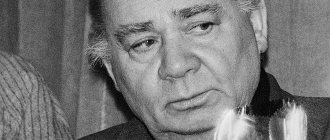Biography
Nina Pavlovna Grebeshkova is an actress of Soviet and Russian cinema and theater, Honored Artist of the Russian Federation, who gained all-Union fame after participating in Leonid Gaidai’s films “The Diamond Arm”, “Prisoner of the Caucasus, or Shurik’s New Adventures”.
Actor Nina Grebeshkova
Nina was born on November 29, 1930 in a simple Moscow family. The girl's father worked as a painter, her mother as a dressmaker. When the war began, Nina was in third grade. The father went to fight, and the mother and three children (Nina Grebeshkova has two brothers) went for evacuation to the village of Surmino (Penza region).
The girl was lucky with her teachers - she was taught by teachers from the Frunze Academy. Nina enjoyed going to school and dreamed of becoming a primary school teacher. She enjoyed interacting with children. At that time, the future actress did not even know about VGIK.
Chance intervened. In the tenth grade, she came to her friend’s birthday and got into conversation with her father, the poet Vladimir Lugovsky. He told Nina Grebeshkova about the profession of an actress and invited her to try herself in this role.
Nina Grebeshkova in her youth
After school, the girl, along with Maria Lugovskaya, applied to the theater institute and entered Gerasimov’s course the first time. Nina Pavlovna calls her course at VGIK motley, because in the same audience there were mature, serious people (Vasily Ordynsky and Yakov Segel) and frivolous youth who constantly laughed and enjoyed life.
Movies
Nina Grebeshkova began acting in films already in her first year. Her debut was an episode in the film “Brave People”, where she played a girl with a doll. After the film was shown, the entire Gagarinsky Lane, where Nina Grebeshkova lived, considered her a movie star. This is how the creative biography of the artist began. In the early 50s, cameo roles followed in the comedy “Sporting Honor” and the short film “Hypnosis Session.”
Nina Grebeshkova in the film “Honor of a Comrade”
In her third year, the actress was invited to film in Leningrad. She played Galya Bogacheva in the film “The Honor of a Comrade,” a film adaptation of Boris Izyumsky’s work “Scarlet Epaulets.” And then it started spinning and spinning.
In the 50s, Nina Grebeshkova became the favorite of millions of Soviet viewers. At first she played schoolgirls, then appeared on screen as mothers and teachers. She was lucky to star with the master of Soviet cinema Ivan Pyryev in the film “Test of Loyalty”, which also starred Sergei Romodanov, Marina Ladynina, Vasily Toporkov.
In 1956, yesterday’s graduate of VGIK appeared on the screen in the comedy about Komsomol members who founded a state farm in the Kazakh virgin lands - “Restless Spring.” A year later, the actress appeared in the drama about a Kazakh revolutionary girl, “Botagoz.” In the same year, Grebeshkova’s filmography was replenished with a role in the children’s fairy tale film “Star Boy.” In 1959, two films were released with the participation of Nina Pavlovna - the war film “A Girl Looks for Her Father” and the film adaptation of “Mumu”.
Nina Grebeshkova in the film "Mumu"
In the early 60s, the actress received roles in comedies, dramas, melodramas, children's and war films - Nina Grebeshkova played in more than seventy films, but was remembered for her vivid episodes in the comedies of Leonid Gaidai.
Gaidai’s first film, in which Nina Grebeshkova starred, was the film story “Thrice Risen” about the fate of the small steamer “Eaglet”. After being forgotten, the ship was restored and set off on another voyage along the Volga. The film featured a stellar cast - Alla Larionova, Vsevolod Sanaev, Nadezhda Rumyantseva. Nina Grebeshkova got the role of Zoya Nikolaevna, the school director. The film did not receive all-Union popularity, but became a good school for the director.
The real success began with “Prisoner of the Caucasus”. Gaidai invited Nina to star in a comedy - she, without hesitation, went with him to the Caucasus. To do this, Grebeshkova had to refuse another tempting offer. In “Prisoner of the Caucasus,” Nina Pavlovna played a nurse from a mental hospital. After that, the actress appeared in almost all the films of Leonid Gaidai and Georgy Danelia.
Yuri Nikulin and Nina Grebeshkova in the film “The Diamond Arm”
Danelia gave Grebeshkova the script and said: “Choose any role.” Nina appeared on screen in different images, but is remembered for her comedies. Many films featuring the actress have become a thing of the past, unable to stand the test of time, but “The Diamond Arm” and “It Can’t Be!”, in which Nina Grebeshkova played central roles, are still watched with pleasure by viewers today. The only film by Leonid Gaidai that Nina Grebeshkova did not appear in was the comedy “Ivan Vasilyevich Changes His Profession.”
In 1982, Nina Grebeshkova starred in the highest-grossing film of the season, Sportloto 82, which was watched by 55 million viewers in the USSR. The actress got the role of Claudia Antonovna, the aunt of the main character Konstantin (Algis Arlauskas).
Nina Grebeshkova in the film "Sportloto - 82"
The actress still sometimes appears on screen in episodes - she says that she is no stranger to it. According to Nina Pavlovna, playing a small role is much more difficult than it seems, because in one or two sentences you need to reveal the character of the hero, show his personality. Among the actress’s works in the 2000s are the TV series “Kamenskaya-2”, the ironic detective stories “Viola Tarakanova” and “Dasha Vasilyeva”, the musical film “First at Home”, and the melodrama “Winner”.
Nina Grebeshkova: Many thought that I was Nikulin’s wife, and with Gaidai I was cheating on him
We congratulated Nina Pavlovna on her anniversary and talked about her film works and her legendary husband.
- Nina Pavlovna, happy holidays. How will you celebrate?
— Let's celebrate my 85th birthday with my family. Yes, I am a long-liver, probably because I was a very happy person. And I understood and appreciated my happiness. Well, then, I’m still needed. This matters too. Previously, I lived for my daughter and husband. Lenya left, I had to raise my granddaughter and take her to college. My granddaughter is already over 30, and now I say: “Well, I can’t die - I need to bring my granddaughter to... retirement!” (Laughs.)
— Did your daughter and granddaughter inherit Gaidai’s talent?
- They are not engaged in creativity, they have a completely different job - both are economists.
— Since your husband’s paintings are shown everywhere, your family probably receives good royalties from the shows?
- We don't need it. But Gaidai’s films are state-owned, shot with state money. Nobody pays anything from impressions. Although I am the heir to copyright.
Woke up the drunken Gorbunkov
— Lenya said: “If I were to shoot melodramas, I would come up with so many things.” Can you imagine, Ninok, they are showing a melodrama, the audience is sobbing, crying, worrying!” - recalls Nina Grebeshkova. — I told him: “Well, take it off!” Write the script." And he told me: “No, people live so hard, let them laugh at least a little. We must give joy!”
Lenya and his co-authors, Maurice Slobodsky and Yakov Kostyukovsky, wrote the scripts for their comedies in our home. Lenya really didn’t like the text in movies. He said: “There should be cinema, not text. A text is a radio, a book. And cinema is a picture, a movement.” For example, the trio on the screen is drinking beer. It would seem that we need lines attached to this picture, something like: let's have a drink, and you have a fly. Lenya took phrases that seemed not directly related to this episode: “It’s good to live. A good life is even better". And it was memorable!
— Did it happen that your phrases that you utter in life were transferred by Gaidai to the screen?
- Yes. When they were finalizing the episode for “The Adventures of Shurik,” I was preparing lunch in the kitchen. Suddenly Yakov Kostyukovsky asks me: “Ninochka, does it ever happen to you that when you come to an unfamiliar house, you feel like you’ve been here before?” I answered sternly and confidently: “No, it doesn’t happen. I always remember where I was, when and with whom.” This phrase was put into the mouth of the heroine Natalya Selezneva in response to Shurik’s question, who found himself in Lida’s apartment for the second time.
In my life, I often told my husband: “You are so gullible!” And Lenya gave this phrase to my heroine, the wife of Gorbunkov (Yuri Nikulin) in “The Diamond Arm.” I have one small find in this image. Remember, Nadya is trying to wake up her drunken husband when she finds money and a gun on him. Neither slaps nor cold water help... I thought: since our Gorbunkov is a government employee, responsible and disciplined, he probably tries not to be late for work, and, most likely, he has the habit of getting up every morning when the alarm clock rings. I suggested setting an alarm clock and ringing it in Gorbunkov’s ear.
After this role, many thought that I was Nikulin’s wife, and that I was cheating on him with Gaidai. There was such a story going around. By the way, Yura Nikulin and I were family friends. My wife Nikulina and I went to school together.
Gave voice to Brylskaya
— Why didn’t your director husband offer you leading roles?
“Now they are trying to sneak in their wives.” And Lenya was a very modest person. I was somehow embarrassed, like it was uncomfortable. He was the chairman of the tariff commission and he himself crossed out my name from the list of artists contending for titles. So I didn’t receive any titles.
I remember one day he told me: I have come up with a big role for you. This was the role of a psychiatrist in “Prisoner of the Caucasus”: “Where is Napoleon?” Well, I think, wow, “big”! But I wasn't offended.
— It is known that Gaidai re-voiced some actors in his comedies. Were your heroines given the voices of other actresses?
- No, I always voiced myself. If Lenya re-voiced, it was only in cases where the artist’s voice did not fit the image. So, for the heroine Svetlichnaya Anna Sergeevna, a more inviting, as they would say now, sexy voice was required. And Svetlichnaya’s voice was very open, simple, and did not suit the role. That's why they invited an understudy. By the way, few people know that in “Anatomy of Love” (Polish film) I voiced Barbara Brylska.
One of Nina Pavlovna’s last roles was in the series “Viola Tarakanova.” Photo: still from the film.
— Which artists are you communicating with today?
“Natashenka Varley doesn’t forget, she calls and asks. She says that she has acted in 40 films, but still for everyone she is a “captive of the Caucasus.” She was our favorite on set. Young, naive, very open. Natasha wrote poetry.
After “Prisoner of the Caucasus,” Etush got Varley into the Shchukin School. And then, having trained as an actress, she also graduated from the Literary Institute, can you imagine?! As Lenya said: “The Institute of Versification.”
Morgunov was rude
— Did Leonid Iovich have any favorite actors?
- Nikulin was one of his favorite artists, Yura was a tireless inventor on the set. I tried to do a lot of takes and came up with something. It was he who suggested putting the dwarf under the blanket so that he would scratch his heel instead (in the shot it seems that the Goonie reached his heel with his hand without bending), he suggested injecting the hero Morgunov in “Prisoner of the Caucasus” with a huge syringe.
— Did you hear that Gaidai didn’t get along with Evgeny Morgunov on the set?
— Morgunov allowed himself to be rude. Once, when they were watching the filmed parts, Morgunov brought a girl into the hall (which was a violation of the rules) and allowed himself to make familiar remarks about Gaidai.
I remember Lenya coming to our hotel room, so upset, saying: “Well, what should we do? Such rudeness, and he still has filming..."
I see that since this worries him, I need to discuss it with him, talk to him, calm him down. And I told him the story that they told me at the institute: “When Mikhail Ilyich Romm was filming the film “Thirteen,” Kolya Kryuchkov was supposed to play the main role. And Nikolai Afanasyevich was already so popular and important. And he allowed himself to say something impolite to Romm, like why are you chasing us - how many takes and so on. And between them - such a puny, thin Jew Romm and Nikolai Afanasyevich - an incident occurred. And this is what Romm did: the next day, filming - the characters were moving in a chain along the dunes (they were filming in the sand), the Basmachi were shooting. And Romm commands: “Kolya, fall!” Nikolai Afanasyevich (at the director’s command) falls. And then Romm says: “That’s it, send Nikolai Afanasyevich to Moscow. The role is over." That is, “the hero is killed”!
Director Ivan Pyryev (by the way, I acted with him) was such a kind of sadist. The actor whom he disliked was forced to work, to play, but he positioned the camera in such a way that this actor did not enter the frame, but he was on the set all the time. Then they look at the material, but the actor is nowhere to be found on the tape. In general, the directors dealt with the actors as best they could.
And so, I remember, Lenya and I were all thinking about what to do with Morgunov. In the end I say: “You know, this is your painting, and you must make a very good painting. And for the sake of her success, you must give a damn about your ambitions. Film Morgunov all the time and some details, close-up of his hand, and so on. Let him work more. It’s better for the picture to have him.” And Lenya agreed with me. I didn’t go into conflict. True, he didn’t talk to the artist afterwards, although Morgunov asked him for forgiveness.
“Everything was perfect at home”
— What was Leonid Iovich like in everyday life?
- Unadapted. He didn’t care about anything... By the way, he put his naivety, indifference to material wealth, and inability to cope with everyday life into his hero Shurik. Shurik is like Lenya in his youth, an intelligent boy with glasses. There is a lot of Gaidai’s personality in this role. And that’s why the hero turned out to be so charming.
Lenya was completely focused on creativity. He constantly thought about cinema, about scripts. He came home and was silent. I can’t say that in ordinary life Lenya always joked. He put all his humor into his paintings. At first I was even angry, like, why is all the housework on me, I’m doing everything on myself. And he once told me: “I can’t live without you, I’ll die.” Like a big child. And yet, even though I didn’t really buy anything for the house, one day I brought home four chairs. He says that after filming “12 Chairs” they remained. I told him: “Well, why do we need such chairs, they don’t fit in at all.” And he: “Let’s keep it as a souvenir.” He treated his paintings like children.
Leonid Gaidai, Anatoly Papanov and Alexander Shirvindt on the set of the film “Incognito from St. Petersburg.” Photo: RUSSIAN LOOK
— I read the story of how you sent him for onions...
- Yes. There was a period when onions were in short supply and the queues for them were long. And Lenya is a war invalid, and he is allowed to skip the line. I see there is a queue for the onion machine. I go home and say: “Lenya, there’s such a queue there!” Please go buy at least a kilogram.” He went and disappeared for four hours. He returns with a string bag with a kilogram of onions in his hands. I waited in the entire line because I was embarrassed to climb forward. “Why did you buy one kilogram when they gave me three?!” - “So you said a kilogram!”
A light bulb on his desk might burn out, and he would say: “Listen, Ninok, your light bulb burned out there.” He drove the car perfectly, but when something happened to it, he could come and say: “Ninok, something is dripping there.” I ask: where, what? “Well, I don’t know,” he says, “I looked, and there was something wet down there.” As for what was dripping - antifreeze or oil - he was not interested.
We have had conflicts. It's all about the little things. Imagine, when a person gets ready to run errands, the first thing he does is put on his shoes. And then: “Oh, Ninok! I forgot the folder! Sorry, I left my glasses in the room. Please, bring me a notebook...” And so on ad infinitum! And every day.
-Have you talked to each other about love?
- No. I asked him: “Do you love me?” He looks at me like that, his eyes became wider than his glasses: “Do we need to talk about this?” I tell him: “Well, what about it? A woman always loves to be told about love...” He: “Yes?” And the conversation came to nothing. Although there was a time when Lenya gave me flowers every Sunday.
DATING HISTORY
“I won’t lift a big woman, but I’ll carry a little one in my arms all my life.”
“Gaidai met his main woman in life - his first and only wife - in Moscow, when he was already studying at VGIK,” recalls writer Fyodor Razzakov. — The romance between them began by accident. Nina once approached Leonid and was indignant: why, when drawing up the rehearsal schedule, did he always put her last? “I go home every time at 12 at night,” the girl was angry. “Isn’t anyone accompanying you? Then I will do it!” - said Gaidai and began to regularly accompany her home.
“One day, Lenya, with such a sense of humor that is unique to him, says: “Well, you and I keep walking and walking, let’s get married!” - said Nina Grebeshkova. “And I took it as another joke.” “What are you talking about, Lenya,” I say, “you’re so long (Gaidai’s height was 1 meter 84 centimeters. - F.R.), and I’m so small (she’s 1 meter 50 centimeters. - F.R.).” . And he said to me: “Well, you know, Ninok, I won’t lift a big woman, but I’ll carry a little one in my arms all my life!”
There were marriage proposals before Gaidai. But yes, I only answered him. I remember telling my mother that I was getting married. For whom? For Gaidai. She knew him. All our classmates visited us, including him. Mom asked: “Why for Gaidai? Don’t you see his shortcomings?” “Everyone has them,” I replied. “If you can put up with his shortcomings for the rest of your life, then get out. But if you’re going to re-educate him, you’ll be wasting your time.” Mom was very wise...
BIOGRAPHER'S OPINION
Writer Fyodor RAZZAKOV: She supported the master with her love of life
“Nina Grebeshkova admitted that her main role is that of a wife,” writer Fyodor Razzakov, author of biographies of many Soviet cinema stars, told KP. - Moreover, she put a double meaning into this concept. In life, her main role is the director’s wife. But in the cinema, with the light hand of Gaidai, she played many wives: Gorbunkov’s wife in “The Diamond Arm”, Bruns’s wife in “12 Chairs”, Gorbushkin’s wife in “It Can’t Be!”, Hyväninen’s wife in the film “Behind the Matches”. At the same time, she is a professional actress, even cinema luminaries appreciated her. In her youth she starred with Daneliya and Pyryev. When Gaidai’s films became successful, everyone began to say: you play for your husband, you’re busy, why call you? And they invited few. And out of modesty, her husband filmed her only in episodic roles. I think if it weren’t for Gaidai, Nina Grebeshkova would have become a leading actress. But with such a helpless husband in everyday life, she had to be his nanny, organize both rest and work. Gaidai was very lucky with his wife; she dedicated her life to him, creating all the conditions for creativity. In life, Gaidai was not a cheerful person, but rather a self-contained Samoyed. And Grebeshkova is an absolute optimist, a laugher. And with her love of life she charged and supported the master who doubted everything.
Personal life
Nina Grebeshkova was married to Leonid Gaidai for more than 40 years. The personal life of the actress and film director was happy. The young people met at VGIK. Leonid immediately noticed the little laugh, but did not think that Nina would become a muse for life. Gaidai was 8 years older than Grebeshkova; he went through the war and was wounded in the leg. Leonid’s passion at that time was cinema, but the young director’s actress was captivated by her sincerity, simplicity, and inexhaustible optimism.
Nina Grebeshkova and Leonid Gaidai
Once Grebeshkova made a remark to Leonid Gaidai about a dirty shirt. The man, touched by such concern, confessed his love to the girl. Nina jokingly said: “There’s a big difference in height, we won’t look good together.” But soon the couple got married.
The wedding was celebrated modestly. The newlyweds settled in a small room with Nina Grebeshkova’s parents. From the first days, the actress realized that she was living with a genius and accepted it. First of all, the girl became the caring wife of the director, and only then an actress. A few years later, the couple moved into their own 3-room apartment. Grebeshkova took care of everyday life: Nina Pavlovna admits that she had to hammer nails and change light bulbs herself.
Nina Grebeshkova with her daughter
Nina Grebeshkova and Leonid Gaidai have different characters. The director preferred solitude, and the actress preferred society, and besides, Leonid did not want children. When Nina Pavlovna became pregnant, her husband was delighted. The master doted on his only daughter Oksana, but he told his wife that there would be no more children. Nina Pavlovna dreamed of giving birth to 3-4 children, but she resigned herself to her husband’s decision. Gaidai remained a big child for Nina Pavlovna all his life.
After graduating from school, Oksana entered an economics university and, while a student, got married. After receiving higher education, the girl made a professional career in the banking sector. The family of Gaidai and Grebeshkova’s daughter also had a daughter, Olga Khudyakova. The girl followed in her mother's footsteps and received an economic education.
Nina Grebeshkova
At the age of 70, the director fell ill - doctors diagnosed pulmonary edema. Nina Grebeshkova was constantly on duty in her husband’s room. At one point, Leonid stopped breathing. Gaidai died in the arms of his beloved wife. The actress says that for her Gaidai is still alive, he just came out for a short time.
Grebeshkova Nina Pavlovna: family
In 1953, the lovers got married. The celebration was modest. Nina and Leonid signed in one of the capital's registry offices. Further celebrations took place at home.
Gaidar was offended by his wife. The fact is that Nina refused to take his last name. It's simple: directors and audiences knew her as Grebeshkova.
The family life of two creative people was far from ideal. At first, the young people had to huddle in Nina’s parents’ room. Five people lived in a small area. These are the parents of our heroine, her younger brother and the young spouses themselves.
Over time, the housing issue was resolved. L. Gaidai and N. Grebeshkova moved to a 3-room apartment. Soon they had a common daughter, Oksana. The new father doted on the baby. But he immediately told his wife that he no longer wanted children. For Nina this turned out to be a real blow. After all, she dreamed of a big family. But over time, the woman came to terms with the fact that she had one daughter.
Nina Grebeshkova now
In 2020, with the participation of the actress, Nikolai Lebedev’s disaster film “Crew” was released. Nina Grebeshkova played the role of an elderly passenger on a plane who, upon arriving in a southern country, found herself at the epicenter of a volcanic eruption. The main cast of the film included Danila Kozlovsky, Vladimir Mashkov, Elena Yakovleva, Agne Grudite, Katerina Shpitsa. In Russia, the film was watched by more than 5 million viewers, while the creators collected $22 million.
Nina Grebeshkova in the film “Crew”
Now the elderly actress spends her time, like most Russian pensioners, at the dacha. After the death of Leonid Gaidai, the house on the plot burned down after being set on fire by hooligans, but soon the director’s friends and fans helped Nina Pavlovna rebuild it. Nina Grebeshkova often visits her dacha, which is located near Zvenigorod, and gardens. The artist has two cats: Masyanya and Grusha.
In 2020, the film crew and designers of the “Ideal Renovation” program visited the country house of the Honored Artist of the Russian Federation. After the work of the craftsmen, the dacha was completely transformed and became suitable for year-round use.
In July 2020, television crews again visited Nina Grebeshkova’s garden plot. This time, landscape designers were brought in to work and transformed the local area by building a summer gazebo on the site. After getting acquainted with the result of the masters' work, the actress was pleasantly surprised.
Filmography
- 1950 — “Brave People”
- 1954 — “Test of Loyalty”
- 1960 — “Thrice Risen”
- 1966 — “Prisoner of the Caucasus, or New Adventures of Shurik”
- 1968 — “The Diamond Arm”
- 1968 — “We’ll Live Until Monday”
- 1971 — “12 chairs”
- 1975 - “It can’t be!”
- 1976 — “Days of Surgeon Mishkin”
- 1982 — “Sportloto-82”
- 1988 - “That Was Last Summer”
- 1989 - “Private Detective, or Operation Cooperation”
- 2002 — “Kamenskaya-2”
- 2016 — “Crew”
Born 29.11.1930, Moscow
Nina Pavlovna Grebeshkova was born on November 29, 1930, in Moscow. Since childhood, she dreamed of being a first grade teacher. She loved children very much, and it seemed to her that communicating with them was very interesting. But everything turned out differently.
In fact, such a question did not arise in the Grebeshkovs’ house. However, having received the certificate, her friend took her to VGIK. Grebeshkova had no idea what VGIK was. But, nevertheless, the girl immediately enrolled in Sergei Gerasimov’s course. Grebeshkova was 17 years old, she liked everything, everything seemed beautiful and sublime. There were people around who had gone through the war: Lev Kulidzhanov, Yakov Segel, Gleb Komarovsky, Vasily Ordynsky. It was a varied course - mature people who already knew what life is and what it’s worth, and frivolous people like Nina Grebeshkova, like Alla Larionova, who laughed more, they were entertained by everything...
Nina Grebeshkova began acting already from her first year. In the film “Brave People,” the student played a small role as a girl with a doll. And it was enough to appear in the episode for the entire Gagarinsky Lane, in which the future actress lived at that time, to begin to consider her a movie star. There were few films then, and everyone watched each picture several times. Then there were more episodes, and in the third year she went to Leningrad to star in the film “The Honor of a Comrade” based on “Scarlet Epaulets” by Biryukov, in the role of Galya Bogacheva.
The actress appeared on the country's screens in the early fifties and immediately became a beloved and popular actress. She worked hard and passionately. The films “The Honor of a Comrade” and “Restless Spring” opened the way to big cinema for the young charming blonde. Grebeshkova began with the roles of girls, schoolgirls, and pioneers. Then she played young mothers and teachers. The actress was lucky enough to star in the film “Test of Loyalty” by the classic of Soviet cinema Ivan Pyryev. However, the following films did not bring fame to the actress.
By the will of fate, Nina Grebeshkova was destined to become the wife of a brilliant man - Leonid Gaidai, thereby, alas, relegating herself to the background. Despite the fact that Leonid Iovich Gaidai made funny, kind comedies, he himself was a serious, demanding person, could not stand it when someone pretended to be a calf's delight, he was happy for no reason.
One day, Gaidai invited his wife to star in an episode of his comedy “Prisoner of the Caucasus.” And the actress, refusing the tempting offer of another director, without hesitation, went with her husband to the Caucasus. Since then, Nina Pavlovna has starred in almost all the films of Gaidai and another, no less famous director, Danelia.
Leonid Gaidai had a wonderful relationship with Gia Danelia. They respected and valued each other very highly. Danelia played a significant role in Gaidai’s life. Take, for example, the fact that Danelia obtained permission to film “12 Chairs” and gave this opportunity to Gaidai, knowing that he dreamed of it.
Danelia often featured Nina Grebeshkova in his films. And after a wonderful role in the film “Tears Fell,” Danelia began to call Grebeshkova in all his films.
The actress could play a woman of any profession, a mother, an aunt, an old village woman - a variety of roles. But she considered comedy difficult for herself, although from a certain time she devoted herself exclusively to her husband’s comedy genre.
True, Gaidai made fifteen to sixteen films, but Nina Grebeshkova has more than sixty to her credit! Another thing is that those films in which the actress starred practically died and did not stand the test of time. Let the directors not be offended, because they also put their souls into their work. But Gaidaev’s survived.
But many artists suffer because there are no roles for them... Most likely, it is simply difficult for them to lower the bar. And Nina Grebeshkova is no stranger to acting - she has been playing episodes all her life. She continues to do this today. But the episode is more difficult to play than it seems at first. It is necessary to literally reveal in three or four words the image, character, and what is there - the biography of the hero! In an episode you are either there or you are not. Therefore, probably, only a talented person can play a small role so that it is remembered.
They say that being a good person is not a profession. And Nina Grebeshkova managed to prove the opposite. To prove that the profession of an actress is not her main title. The main thing is that she was the wife, muse and guardian angel of comedian Leonid Gaidai. And therefore we can safely say that his comedies contain a considerable share of the works of his wife.
And in everyday life, Gaidai was a completely helpless person. It’s not that he couldn’t screw in a light bulb, but he couldn’t always find the switch either. But he gave flowers to his wife every Sunday.
And in general, the human factor played a big role in the lives of Gaidai and Grebeshkova - in work, in family, in everyday life. Our person or not our person, decent or dishonest. This somehow determined the circle of people. They were not very close friends with anyone, did not go to visit, did not gather for a feast. But a lot became clear after Gaidai left. ...Leonid Gaidai died in front of his wife from pneumonia. It turned out to be a pulmonary embolism—a blood clot had jammed the artery.
Filmography:
1950 Brave People 1951 Sports Honor 1953 Hypnosis Session 1953 Honor of a Comrade 1954 Test of Loyalty 1956 Restless Spring 1957 Star Boy 1957 Botagoz 1959 A Girl Searches for Her Father 1959 Mu-mu 1960 Normandy - Neman 1960 Thrice Resurrected 1961 Someone else's Wallet 1961 Life First 1962 Alder Island 1963 The Blind Bird 1964 Calling fire upon ourselves 1964 The Adventures of Tolya Klyukvin 1964 The Tale of Lost Time 1966 Captive of the Caucasus or Shurik's New Adventures 1968 The Diamond Arm 1968 We'll Live Until Monday 1971 Twelve Chairs 1975 It Can't Be! 1975 Step wider, maestro 1976 Days of the surgeon Mishkin 1977 Harmony 1978 Live in joy 1980 Behind the matches 1982 Sportloto-82 1982 Tears were falling 1984 Lyubochka 1984 The Unknown Soldier 1985 Give us men! 1985 Life Danger! 1988 French 1989 Private Detective, or Operation Cooperation 1993 Nastya 1995 Heads and Tails 1998 Gift of God 1999 Fan 2000 Doctors 2001 Avalanche 2002 Railway Romance 2004 Wanderings and incredible adventures of one love - series
Actors section











